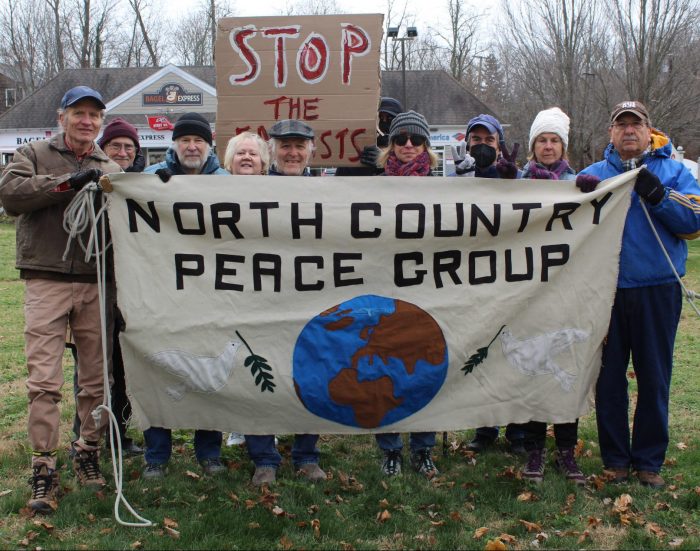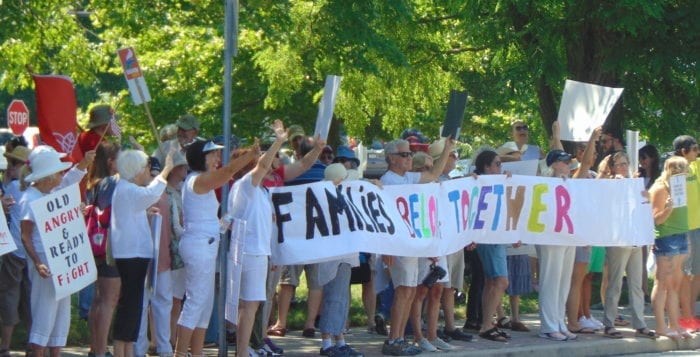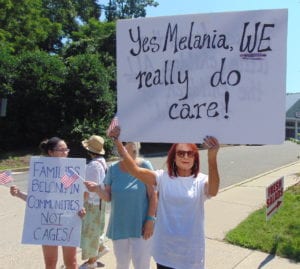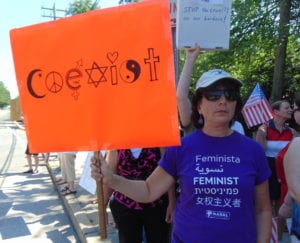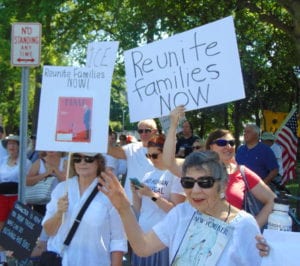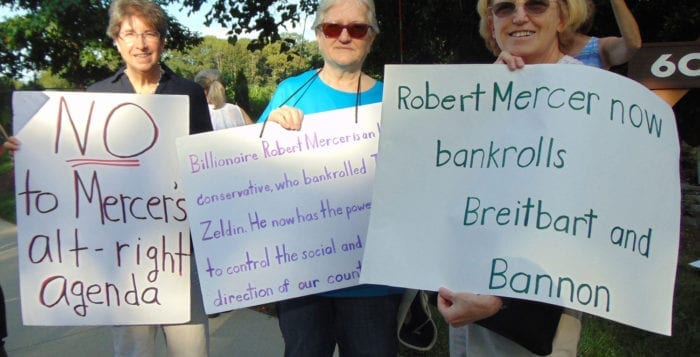This month, North Country Peace Group marks its 20th anniversary.
Posted at the southeast corner of Route 25A and Bennetts Road in Setauket, NCPG has maintained a visible weekly presence within the community, advocating various causes throughout its history. On Saturday, Dec. 10, some members reflected on this milestone year for their organization and discussed why they remain committed to their cause.
Roots
Bob Becherer was among the founding members of the peace group. He traces the organization’s origins beyond 20 years when, in the early 1990s, a group of civic-oriented parishioners of the St. James R.C. Church formed the Peace and Justice Community.
“It was really out of that group that we became the North Country Peace Group,” Becherer said, crediting Bill McNulty as the founder and leader of both organizations.
In an exclusive interview, McNulty chronicled his “traditional, apolitical” upbringing and his eventual reawakening. Growing up, he said he maintained a 16-year connection to the military. Between U.S. Army Junior Reserve Officer Training Corps, ROTC, active duty and active reserve service, McNulty kept in close contact with the military and military culture. Over time, however, he began to question these ties.
Catalyzing McNulty’s transformation was America’s foreign policy throughout Latin America during the 1970s and ’80s. His early advocacy work centered around the School of the Americas, a training ground founded as a bulwark against the spread of communism. Over time, McNulty said, the school devolved. A string of murders and rapes connected to the School of the Americas prompted him into action.
During that time, McNulty said he devoted his energies to “increase the knowledge among the American population that this school existed and that we were, through our tax dollars, paying for training for these soldiers.” His resistance led him to a federal prison, where he served for six months.
Within the full swing of these events, McNulty soon got involved with the Peace and Justice Community, initially focusing on America’s involvement in Iraq during the Persian Gulf War (1990-91). As the PJC’s work took on more secular aims, they moved out of the church and onto the streets. NCPG emerged from the second Iraq War (2003-11).
Organizational principles
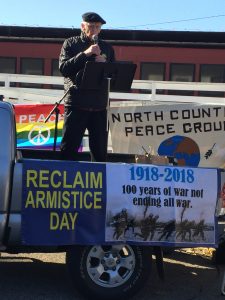
McNulty offered some of the philosophical precepts underpinning the NCPG’s activism. He said the group seeks to challenge conventional wisdom, to prompt community members to think critically about the information authorities give them. Through this, he said the group has often met fierce resistance from dogmatists and partisans.
“Very often, when you bring a message that’s contrary to the conventional wisdom, they get angry at you,” he said. “They don’t want to hear what you have to offer because it’s very startling and shocking. There’s a cognitive dissonance.”
McNulty maintained that NCPG, since its inception, has rejected the notion of reciprocal violence. “The Old Testament thinking of an eye for an eye and a tooth for a tooth, you have to break it with that idea of love and acceptance,” he said.
He viewed the human propensity toward violence as a conflict between instincts and ideals. Though he held that most people are born peaceful and good, he sees many as conditioned to accept violence and war as the natural order.
“People, I think, are pretty good, but they acquire a lot of these characteristics as a result of what they experience in life,” he said. “Down deep, people are good because they always act well when the dog falls down the well or when the tornado rips the roof off the house.”
McNulty said that overcoming aggression requires conscious effort, but doing so may be the recipe for lasting peace. “The idea is to take the words of the song, the words of the poem, to take the suggestion of the painting or the sculpture or whatever else and to put it into practice,” he said. “It’s a very hard job.”
Two decades into the struggle for peace
One of the essential features of NCPG throughout its 20-year history has been the persistence of its members. Member Susan Perretti regards the organization as a weekly reminder to the community that there is an alternative to unceasing human conflicts worldwide.
“We’re sort of a reminder to the community that passes us by,” she said. “It’s a reminder that we still have war — endless war — going on and that violence itself is not the answer.”
Robert Marcus, another NCPG member, said the fight for peace and preserving democracy go hand in hand. He said that standing on the street corner is a way to promote both ends.
“We have to do everything we can to make a more peaceful world,” Marcus said. “We can’t just take it for granted. We have to work really hard for peace and to strengthen our democracy because it’s under threat.”
For John Robinson, participating in the peace group’s various activities is a way to connect to a larger cause and to make a difference on a grander stage. “It feels good to be around people who have the same concerns, the same thoughts, the same issues that I do,” he said. “Coming out here makes a real statement about the need for peace and the need to treat each other well.”
Myrna Gordon said she and NCPG use their platform to advocate a new mode of thinking around the way the United States government spends its taxpayer dollars. According to her, too great a share of the federal budget is devoted to perpetuating violence.
“We need to move the money out of the military and back into human needs and human lives so that we will have that money and be able to fix roads, provide better education, health care and everything else,” she said.
An alternative to war
McNulty was asked if he believes a lasting peace is possible or if humanity is doomed to a fate of unending war. He admitted that lasting peace may not be attainable but that pursuing such an ideal is.
‘We have to evolve past this idea — as a human species and not just as Americans — that war and killing one another is the only solution.’
— Susan Perretti
“We would like to hope that it is possible,” he said. “We helped each other to a great extent, and we have affected a few people around our immediate neighborhood, but they’re still making war. The School of the Americas is still open, still training soldiers to keep people under control.”
Perretti offered a slightly different take by suggesting humanity could adapt itself to a condition without war.
“The point is that we have to evolve past this idea — as a human species and not just as Americans — that war and killing one another is the only solution,” she said. “I don’t know what that takes, but for me I’m here because I won’t give up the struggle, and I want to be faithful to what I believe in my heart.”
Whether humans can coexist and overcome violence is still to be decided. Twenty years after their organization’s founding, members of North Country Peace Group remain stationed at their usual street corner, committed to giving peace its fair shake.

